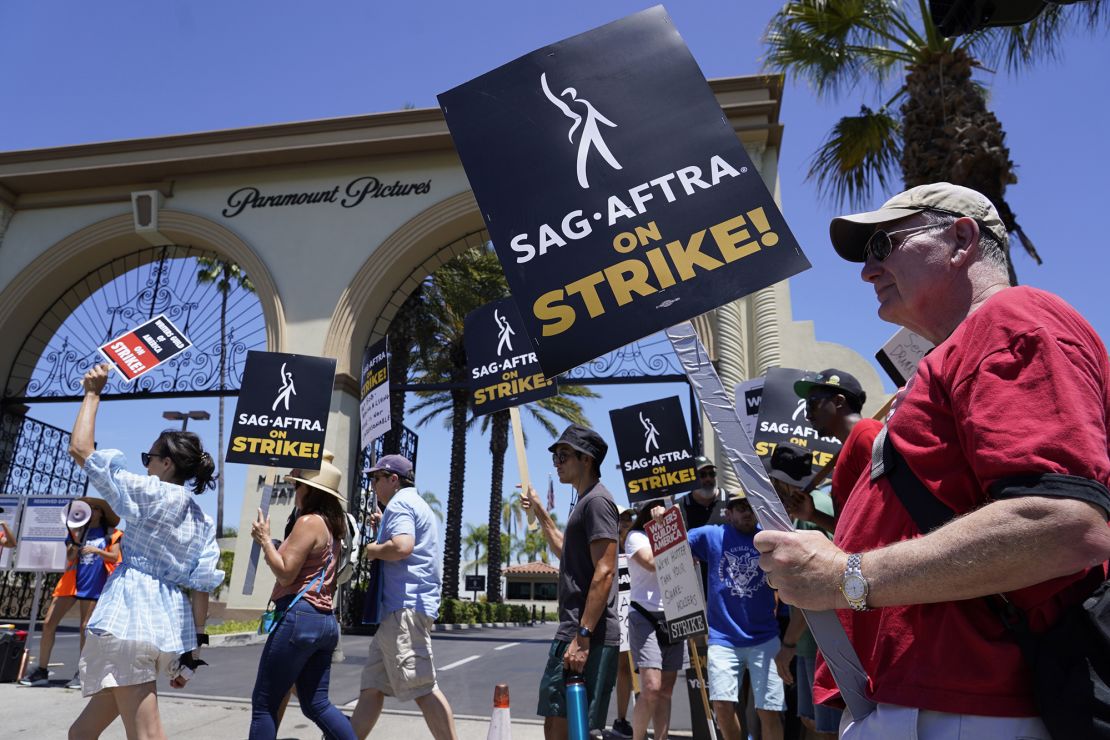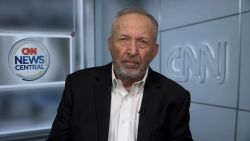On Friday, the SAG-AFTRA, a union representing about 160,000 Hollywood actors, officially went on strike after failing to reach a deal with Hollywood’s biggest studios.
That means Hollywood actors and writers are on strike simultaneously for the first time in more than 60 years, bringing most film and television productions to a halt.
Among other demands, actors on strike are calling for increased pay and a rethinking of residuals, which union members say has significantly diminished amid the rise of streaming services. Residuals are financial compensation paid out to actors whenever TV shows or movies they’ve appeared in are replayed.
Here are some significant numbers:
160,000
The union’s 160,000 members join the 11,000 Writers Guild of America members who have been striking since May.
While many of the world’s highest-paid celebrities, including Meryl Streep and Matt Damon, have voiced their support for the strike, the concerns about higher pay and residuals affect thousands of actors who perform in hundreds of films and TV shows.
SAG-AFTRA’s president, Fran Drescher, pushed back on the notion that all actors are wealthy, saying that a vast majority “are just working people just trying to make a living just trying to pay their rent, just trying to put food on the table and get their kids off to school.”
“Everything that you watch, that you enjoy, that you’re entertained by are scenes filled with people that are not making the big money,” she added.
$27.73 per hour
That’s how much the US Bureau of Labor Statistics reported as the average pay for California actors in 2022. However, the BLS noted in the data that actors aren’t paid full-time year-round due to the nature of the job.

Before the contract between actors and movie studios officially expired this week, SAG-AFTRA members had negotiated specific minimum rates for performers. For example, an actor who worked on a television show for one week was paid a minimum of $3,756.
However, Kellee Stewart, an actress who has performed for more than 20 years and has appeared on the television series “All American” and “Black-ish,” noted that performers traditionally don’t get to take home the number that appears as their rate.
“You don’t get to keep it all when you get a paycheck,” she said.
“You have to pay taxes, plus commissions. For me, that would include an agent, a manager, and a lawyer that negotiates your deals. Right away, when you’re giving a quote for what you’re going to get paid, you already know that’s really going to be 35% less, give or take,” she added.
$270 million
Dwayne “The Rock” Johnson was the highest paid actor of 2022, raking in $270 million, according to Forbes’ list of highest-paid entertainers. Johnson received hefty paydays from his roles in “Jungle Cruise” and “Red Notice,” but, according to Forbes, the majority of his earned income in 2022 came from his tequila brand, Teremana.
Tom Cruise made headlines last year for reportedly making $100 million from his deal to star in “Top Gun: Maverick,” for which he received a cut of ticket sales, according to Variety.
On CBS’ Face the Nation Sunday, IAC Chairman Barry Diller called on top-paid actors and movie executives alike to take 25% pay cuts.
“You have the actors union saying, ‘How dare these 10 people who run these companies earn all this money and won’t pay us?’ While, if you look at it on the other side, the top 10 actors get paid more than the top 10 executives,” Diller said. “I’m not saying either is right. Actually, everybody’s probably overpaid at the top end.”
12.7%
The minimum amount of money a performer must take home in one year to qualify for health insurance is $26,470.
However, while well-known actors are paid millions of dollars to star in movies and TV shows, many members of SAG-AFTRA don’t bring in enough income each year to meet the union’s minimum requirement.
According to Shaan Sharma, an actor and SAG-AFTRA board member, just 12.7% of SAG-AFTRA members qualify for the union’s health plan.
Actor Rod McLachlan, who has appeared in television shows such as “Blue Bloods,” said it’s “a constant struggle” to meet the health insurance threshold.
“If you think about it, $26,000 isn’t a middle-class wage,” he said.
“The thing about the life of an actor is that you have good years and bad years,” he added.
13 cents
Due to the unpredictable nature of TV acting and the competitive nature of landing roles, actors traditionally rely on residual payments, paid out when films or movies are replayed, as a form of steady income when work is hard to come by.
“If you were in a popular episode of a popular show, the income streams could last for quite some time. You have almost 18 months on one level or another where you are receiving income that was significant enough to help you until the next time you did a network show,” McLachlan said.
Actors say that the calculation around residuals has changed. As more shows and movies have moved to streaming services, where it isn’t always clear how often content is replayed, actors say they’re making significantly less money.

“The residuals that I get when it’s on network television versus what I would get on Netflix are night and day,” Stewart said.
On Twitter, Stewart shared a screengrab of five residual payments totaling 13 cents from replays on streaming services.
“There’s not just a difference between traditional residual television and streaming; they’re not even in the same conversation,” she told CNN.
$31 million
On Thursday, Disney CEO Bob Iger said striking actors’ and writers’ demands are “just not realistic.”
“They are adding to a set of challenges that this business is already facing, that is quite frankly, very disruptive,” he told CNBC.
When Iger rejoined Disney as CEO in November 2022, he agreed to an annual base salary of $1 million with a potential annual bonus of $2 million. The agreement also includes stock awards from Disney totaling $25 million.
On Wednesday, Iger agreed to remain in his post as CEO of Disney through 2026 while the company’s board searches for a successor. In his new agreement, Iger is now eligible for a bonus of up to $5 million, according to a company filing, meaning his total pay may reach $31 million per year.
Walt Disney Studios is part of The Alliance of Motion Picture and Television Producers (AMPTP), the trade group that negotiates with currently striking writers and actors. Other major movie studios, such as Paramount Pictures and Sony Pictures, along with streaming services like Netflix and Apple TV+ are members, as well. Warner Bros. Discovery, CNN’s parent company, is also a member.
Netflix’s co-CEOs Ted Sarandos and Greg Peters made $50 million and $28 million, respectively, in 2022, according to a company filing.
In a statement to CNN, the AMPTP said they were “deeply disappointed” with the union’s decision to strike.
“Rather than continuing to negotiate, SAG-AFTRA has put us on a course that will deepen the financial hardship for thousands who depend on the industry for their livelihoods,” the AMPTP said.
SAG-AFTRA did not respond to CNN’s request for comment.
$4 billion
The potential economic impact of the combined writers’ and actors’ strike could cause $4 billion or more in damage, Kevin Klowden, chief global strategist for economic think tank the Milken Institute, told CNN.
Klowden said the double strike, which has brought Hollywood projects to a grinding halt, may affect more than just the US economy.
“London and the UK, Australia, New Zealand and other places, which either have studios or even do post-production, will face a real impact,” he said.
— CNN’s Natasha Chen contributed reporting to this story
























